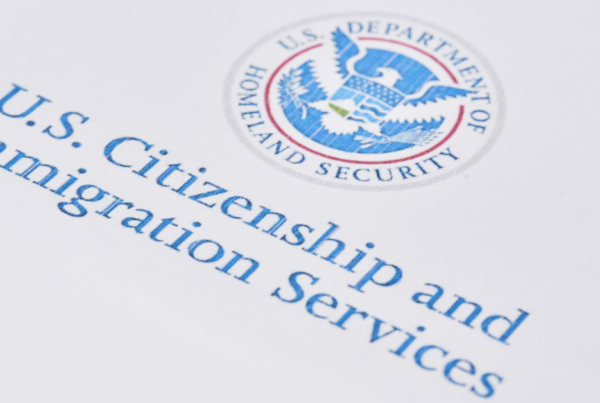
As a leading CA immigration attorney, here at Nelson and Associates, we spend a lot of time talking to clients about the different options that they have for staying in the U.S. Today, we’re talking a little bit about some of the limitations that exist on permanent residency.
CA Immigration Attorney Explains Limitations on Permanent Residency
When you obtain your green card and become a permanent resident in the United States, there are some limitations on that residency. Today we’re going to talk a little bit about those limitations and what they mean to you.
You Can Be Deported!
When you have a green card, but you have not yet obtained your citizenship, you may work and live in the U.S. however, you must also follow specific rules and avoid certain legal complications or you may face deportation back to your country of origin..
So, what are these rules and legal complications?
You may be deported as a permanent resident if you…
- Were inadmissible at the time of your entry to the U.S., time of your adjustment of status, or if you violated the terms of your visa, green card, or other immigration status.
- Were granted conditional permanent resident status but your status was terminated.
- Knowingly helped any alien to illegally enter the United States before, during, or within five years of your date of entry to the U.S.
- Committed marriage fraud.
- Were married for less than two years before getting your green card on that basis, and then had your marriage annulled or terminated within the following two years, unless you can prove that your marriage was not fraudulent or purposefully meant to evade immigration laws.
- Were convicted of a crime involving moral depravity that was committed within five years of your admission into the U.S. (ten years if you got your green card as a criminal informant) and that crime is punishable by a sentence of at least one year.
- Were convicted of two or more crimes involving moral depravity committed at any point after your admission to the U.S. (when the two crimes were not the result of a single scheme)
- Were convicted of an aggravated felony at any time after your admission to the U.S.
- Were convicted of fleeing from an immigration checkpoint at a high speed.
- Failed to register as a sex offender.
- Were convicted of a crime involving drugs (or conspiracy/attempt to commit a crime involving drugs), anywhere in the world at any time after your admission into the U.S. Although, there is an exception to this if the offense was a single offense in which you were convicted of being in possession of 30 grams or less of marijuana for personal use.
- At any time after your U.S. admission, you have been, a drug user or addict. (Note that a court conviction is not necessary to be deportable under this rule, admission is enough.)
- Were convicted of illegally buying, selling, possessing, or engaging in any transactions involving firearms, weapons, or destructive devices, at any time after being admitted to the U.S.
- Were convicted of committing, or conspiring to commit espionage, sabotage, treason, or sedition, if that action is punishable by a minimum of five years in prison.
- Violated the Military Selective Service Act or the Trading With the Enemy Act.
- Violated specific travel and documentation restrictions or if you imported aliens for immoral purposes.
- Were convicted of domestic violence, stalking, child abuse, child neglect, or child abandonment, at any time after being admitted to the U.S.
- Violated a portion of a protective order that is meant to stop credible threats of violence, repeated harassment, or bodily injury.
- Committed or conspired to commit human trafficking anywhere in the world or you have been a knowing aider, abettor, assister, conspirator, or colluder with someone else in human trafficking; or if you are the trafficker’s spouse, son, or daughter and, during the past five years, you have knowingly received financial gain or other benefits from their illegal activity.
- Failed to notify U.S. immigration authorities (in writing) of a change of address within ten days of moving, unless you can prove that your failure was reasonably excusable or not done purposefully.
- Were convicted of giving false information in connection with a requirement to register with U.S. immigration authorities or other violations related to fraud and misuse of visas, permits, and other entry documents.
- Received a final order of deportation for document fraud, forgery, counterfeiting, or related violations.
- Falsely represent yourself as a U.S. citizen to gain any immigration or other benefit. The exception to this is if your parents (natural or adoptive) are or were U.S. citizens, if you lived in the U.S. before age 16, and if you reasonably believed yourself to be a U.S. citizen.
- Are involved in, or at any time after your admission into the U.S. become involved in espionage, sabotage, violations or evasions of any law that prohibits the export of goods, technology, or sensitive information, or in any other criminal activity that is a danger to public safety or national security, or you act in opposition to, or attempt to control or overthrow the U.S. government by force, violence, or other unlawful means.
- Have engaged in or appear likely to engage in terrorist activity, or have incited terrorist activity, or are a representative of a terrorist organization or group that endorses or espouses terrorist activity, or are a member of a terrorist organization (unless you prove that he had no idea of its terrorist aims), or endorse or espouse terrorist activity or persuade others to do so, or have received military-type training from or on behalf a terrorist organization, or are the terrorist’s spouse or child, if the relevant activity took place within the last five years.
- Your presence in the U.S. would create potentially serious adverse foreign policy consequences.
- You participated in Nazi persecution, genocide, torture, or extrajudicial killings, severe violations of religious freedom, or recruitment or use of child soldiers.
- Within five years after U.S. entry, you have become dependent on need-based government assistance for any reasons that did not arise after your entry to the U.S.
- Have voted in violation of any federal, state, or local law. (Although an exception is made for someone who reasonably believes themselves to be a U.S. citizen based on your parentage.)
Can You Be Deported If You Become a U.S. Citizen?
If you are an immigrant who becomes a U.S. citizen, you cannot be deported UNLESS you fraudulently obtained your green card or citizenship.
Are You Looking For an Experienced CA Immigration Attorney?
If you are looking for an experienced CA immigration attorney, Nelson and Associates is available to help. Located in Pasadena, California, Attorney Nelson has been practicing immigration law since 1994. To set up your consultation with Nelson Law today, just call 626-683-3451.



